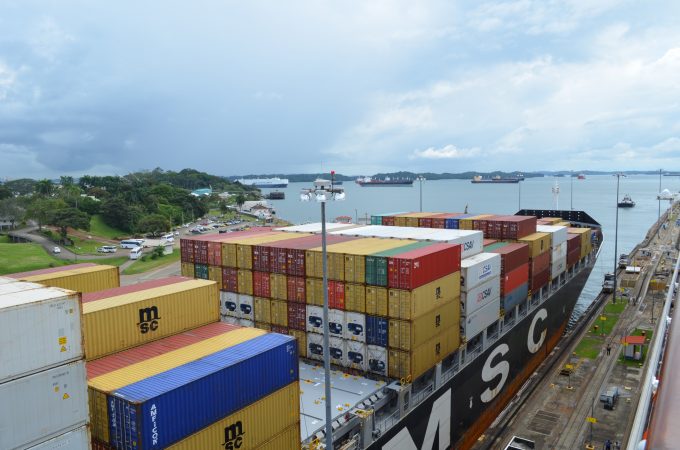MSC adds more ULCVs to orderbook that equates with world's sixth-largest carrier
Undeterred by the threat of additional overcapacity, MSC has ordered a further ten 24,000 teu ...
HON: BREAK-UPF: BEARISH VIEWHLAG: NEW ENTRYAAPL: LOOKING FOR CONSENSUS DSV: PROPOSED BOARD CHANGESDSV: GO GREENCHRW: BEARS VS BULLSCHRW: RUNNING HIGHMAERSK: STRONG HON: BREAK-UP APPEALCHRW: CLOSING QUESTIONSCHRW: HEADCOUNT RISK MID-TERM CHRW: SHOOTING UPCHRW: OPPORTUNISTIC CHRW: CFO REMARKSCHRW: GETTING THERE
HON: BREAK-UPF: BEARISH VIEWHLAG: NEW ENTRYAAPL: LOOKING FOR CONSENSUS DSV: PROPOSED BOARD CHANGESDSV: GO GREENCHRW: BEARS VS BULLSCHRW: RUNNING HIGHMAERSK: STRONG HON: BREAK-UP APPEALCHRW: CLOSING QUESTIONSCHRW: HEADCOUNT RISK MID-TERM CHRW: SHOOTING UPCHRW: OPPORTUNISTIC CHRW: CFO REMARKSCHRW: GETTING THERE

Two major carriers have announced new Panama Canal surcharges on Asia-US east coast transits in response to the canal authority implementing a new booking system to “optimise transit operations”.
As of 1 January, the Panama Canal authority (ACP) will modify its transit reservation system, including changes in the tariff structure and fee amounts and the introduction of new tariffs.
ACP said the modifications aimed “to improve the level of service, to reflect the value of the reservations service, to improve the supply and demand management and to optimise transit operations”.
MSC notified customers today that, “to address the increased costs associated with these changes and maintain [its] commitment to providing reliable and efficient services”, it would introduce a Panama Canal surcharge on 1 January.
The Switzerland-headquartered carrier will charge $40 per teu for all cargo types on services connecting Asia to the US east and Gulf coasts.
And last week, CMA CGM similarly advised of a “Panama Canal transit surcharge” from 1 January, “to recover this extra cost” and “keep providing most reliable services transiting through Panama Canal”.
The French carrier will also charge $40 per teu for all cargo types from Asia to the US east and Gulf coasts via the Panama Canal.
Shippers and forwarders should assume that CMA CGM’s Ocean Alliance partners, Cosco, OOCL and Evergreen, are likely to introduce similar surcharges, given that the services affected, the Chesapeake Bay Express (CBX), Gulf of Mexico Express (GMXP), Manhattan Bridge (MANB), Pacific Express 3 (PEX3), South Atlantic Express (SAX), Taiwan Strait (TWS) and Vespucci Service (VESPUCCI), are all Ocean Alliance services – the AWE9, AWE7, AWE8, AWE6, AWE2, AWE5 and AWE4, respectively.
Of these, only the AWE9 and AWE6 are solely operated by CMA CGM vessels, according to the eeSea liner database. The AWE7 is operated by Cosco; AWE8 by Cosco and CMA CGM; AWE2 by Cosco and OOCL; AWE5 by Evergreen, while AWE4 sees Evergreen and CMA CGM vessels deployed.
A quick Loadstar calculation found that an average vessel with around 12,500 teu would recoup some $500,000 in surcharges for the transit, while a 9,000 teu vessel would gain some $360,000.
One new ACP measure, which aims to discourage late cancellations and no-shows, issues a hefty surcharge, equivalent to 250% of the reservation fee, if the vessel does not arrive within seven days of the booked date.
However, ACP has also introduced “increased flexibility for swapping requests”, so carriers can submit swapping requests up to 14 days in advance of the required arrival time, without charge. For requests made less than 14 days before arrival, a surcharge of 1% of the reservation fee will be applied.
Further, it is introducing “last minute transit reservation tariffs”, to provide an option to vessels unable to obtain a booking slot through regular means and arrive at the canal without a reservation.
Finally, a “vessel scheduling fee” will be applied “to better accommodate vessels that cannot be booked through the regular reservation system but require coordination with the canal to be scheduled for transit”.
“These changes will provide greater flexibility and convenience for customers while ensuring efficient use of canal resources,” said ACP.
Listen to The Loadstar News in Brief Podcast for a 12 minute recap of last week’s supply-chain news!
Comment on this article